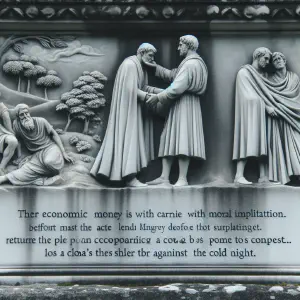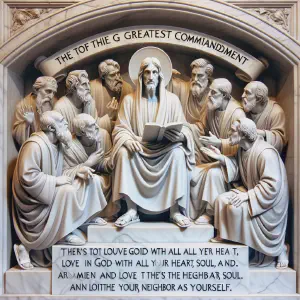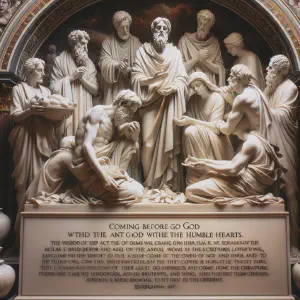The Law of Love and Compassion



Meanwhile, in Macedonia and Achaia, the followers of Christ set a stirring example. They received the word amidst affliction yet with joy from the Holy Spirit, becoming a beacon of faith and hope. Their transformation was profound – from idol worshippers to servants of the true and living God, awaiting the Son He raised from the dead. In Jerusalem, a debate stirred among the religious elite. The Pharisees, having heard of Jesus silencing the Sadducees, sought to test Him. A scholar asked Him about the greatest commandment. Jesus, with wisdom and authority, declared the essence of the law – to love God with all one’s heart, soul, and mind, and to love one’s neighbor as oneself. Upon these two commandments, He proclaimed, hung all the laws and the prophets. In these readings, a tapestry of divine instruction and human response is woven. From the ancient Israelites to the early Christians, from the psalmist’s songs to Jesus’ teachings, a common thread runs – the call to love, compassion, and faithfulness, transcending time and place, echoing into eternity.
Five Questions
What does the passage from Exodus 22:20-26 teach us about God’s view on justice and compassion?
The Exodus passage powerfully conveys God’s deep concern for the marginalized and vulnerable, like aliens, widows, and orphans. It emphasizes that mistreatment of these groups is not just a social injustice but a violation of divine law. God reminds the Israelites of their own experience as aliens in Egypt, fostering empathy and underscoring that their actions towards the vulnerable directly reflect their relationship with Him. The threat of divine wrath for mistreatment signifies how seriously God takes these matters.
How does Psalm 18 reinforce or contrast with the themes in Exodus?
Psalm 18 beautifully complements the Exodus reading by emphasizing God as a protector and deliverer, specifically for those in distress. While Exodus focuses on God’s commands to His people regarding justice and compassion, the Psalm illustrates God’s role as a refuge and strength for the faithful. This duality shows that God not only mandates justice but also actively provides protection and salvation, reinforcing the need for trust and faith in Him.
In what ways does the passage from 1 Thessalonians 1:5c-10 reflect the transformation that comes from faith?
1 Thessalonians 1:5c-10 highlights a profound transformation experienced by new believers. It illustrates how embracing faith in Christ, even amidst great affliction, leads to joy through the Holy Spirit. The Thessalonians turned away from idols to serve the true God, becoming examples to other believers. This transformation underscores the power of faith to fundamentally change lives, leading people from false beliefs to the truth and hope in Christ.
How does Jesus’ response to the scholar of the law in Matthew 22:34-40 encapsulate the essence of Christian teaching?
Jesus’ response in Matthew 22:34-40 masterfully distills the essence of all the laws and prophets into two commandments: love for God and love for neighbor. This simplification isn’t a reduction but rather an elevation of these commandments as the foundation of all others. By stating that all the law and prophets depend on these two commandments, Jesus emphasizes that every aspect of a believer’s life should be guided by love – both divine love and compassionate, selfless love towards others.
How do these scriptures collectively guide a Christian’s understanding and practice of their faith?
Collectively, these scriptures offer a comprehensive guide for living a Christian life. They call for empathy and justice towards the vulnerable, illustrate God’s protective and salvific role, showcase the transformative power of faith, and emphasize love as the core principle of all actions and relationships. Together, they provide a blueprint for living in a way that aligns with God’s will, encouraging believers to embody compassion, faith, and love in their daily lives, thus drawing closer to the heart of God’s teachings.
Bible Study
Exodus 22:20-26
Thus says the LORD:
“You shall not molest or oppress an alien,
for you were once aliens yourselves in the land of Egypt.
You shall not wrong any widow or orphan.
If ever you wrong them and they cry out to me,
I will surely hear their cry.
My wrath will flare up, and I will kill you with the sword;
then your own wives will be widows, and your children orphans.
“If you lend money to one of your poor neighbors among my people,
you shall not act like an extortioner toward him
by demanding interest from him.
If you take your neighbor’s cloak as a pledge,
you shall return it to him before sunset;
for this cloak of his is the only covering he has for his body.
What else has he to sleep in?
If he cries out to me, I will hear him; for I am compassionate.”
The passage from Exodus emphasizes social justice and compassion, key components of Catholic social teaching. It reflects the Ten Commandments’ spirit, especially in honoring God and respecting others’ dignity. The Lord’s instructions to Israel, given through Moses, advocate for the fair treatment of aliens, widows, and orphans, who represent the most vulnerable in society. This aligns with the Catholic Church’s emphasis on the Works of Mercy, particularly in caring for the needy. The passage’s stress on empathy and justice is foundational to Christian ethics and the concept of seeing Christ in everyone.
Psalm 18:2-3, 3-4, 47, 51
I love you, O LORD, my strength,
O LORD, my rock, my fortress, my deliverer.
My God, my rock of refuge,
my shield, the horn of my salvation, my stronghold!
Praised be the LORD, I exclaim,
and I am safe from my enemies.
The LORD lives and blessed be my rock!
Extolled be God my savior.
You who gave great victories to your king
and showed kindness to your anointed.
Psalm 18 expresses deep trust and love for God, highlighting His role as protector and savior. This aligns with Catholic teaching on God’s omnipotence and benevolence, as outlined in the Catechism. The Psalm, traditionally attributed to King David, reflects a personal relationship with God, exemplifying how believers should turn to God for strength and salvation. The Psalm’s acknowledgment of God’s deliverance and protection ties into the Catholic understanding of Divine Providence and grace, where God actively intervenes and guides the lives of the faithful.
1 Thessalonians 1:5c-10
Brothers and sisters:
You know what sort of people we were among you for your sake.
And you became imitators of us and of the Lord,
receiving the word in great affliction, with joy from the Holy Spirit,
so that you became a model for all the believers
in Macedonia and in Achaia.
For from you the word of the Lord has sounded forth
not only in Macedonia and Achaia,
but in every place your faith in God has gone forth,
so that we have no need to say anything.
For they themselves openly declare about us
what sort of reception we had among you,
and how you turned to God from idols
to serve the living and true God
and to await his Son from heaven,
whom he raised from the dead,
Jesus, who delivers us from the coming wrath.
This passage from 1 Thessalonians, written by Paul, emphasizes the transformative power of faith and the Holy Spirit. It reflects the Catholic Church’s teachings on conversion, the role of the Holy Spirit, and the anticipation of Christ’s return. The Thessalonians’ turn from idolatry to serving the true God embodies the Catholic call to repentance and conversion. Their example as models for believers aligns with the Church’s teaching on the communion of saints, where the faithful are encouraged to emulate the virtues of those who faithfully follow Christ.
Matthew 22:34-40
When the Pharisees heard that Jesus had silenced the Sadducees,
they gathered together, and one of them,
a scholar of the law tested him by asking,
“Teacher, which commandment in the law is the greatest?”
He said to him,
“You shall love the Lord, your God,
with all your heart, with all your soul, and with all your mind.
This is the greatest and the first commandment.
The second is like it:
You shall love your neighbor as yourself.
The whole law and the prophets depend on these two commandments.”
In Matthew 22:34-40, Jesus encapsulates the essence of the Law and the Prophets with two commandments: love of God and love of neighbor. This teaching is central to Catholic doctrine, echoing the greatest commandments as described in the Catechism. It highlights the integral relationship between love of God and ethical conduct towards others, forming the basis of Christian morality. The passage reinforces the idea that love is the fulfilling of the law, a core principle in Catholic ethics and a guide for Christian living. Jesus’ response to the scholar of the law demonstrates the interconnectedness of love and obedience in the Christian faith.
Lessons
The readings collectively impart profound lessons on the essence of God’s law and the Christian life. They emphasize the importance of compassion and justice, especially towards the vulnerable, such as aliens, widows, and orphans, reminding us of our own vulnerabilities and God’s mercy. The psalmist’s deep trust in God as a protector and deliverer teaches the value of unwavering faith. The Thessalonians’ transformation from idol worship to steadfast believers exemplifies the transformative power of faith and the Holy Spirit. Finally, Jesus’ teaching about the greatest commandments underscores that love – for God and for our neighbors – is the foundation of all divine laws. These readings, therefore, guide us to live a life rooted in love, compassion, and justice, drawing us closer to the heart of God’s teachings.
Meditation Prayer



The Gospel of Matthew teaches us the greatest commandments: to love You and to love our neighbors as ourselves. This foundational teaching shapes our actions and interactions, fostering a community grounded in love and respect. May this love manifest in our daily lives, promoting peace and understanding in our interactions. Lord, embolden us to live out these teachings. Guide us to be instruments of Your peace and love, caring for the less fortunate, strengthening our families, enriching our communities, and nurturing our mental and emotional health. May our actions reflect the lessons of Your Word, spreading Your light and love in every corner of our world. In Your holy name, we pray. Amen.